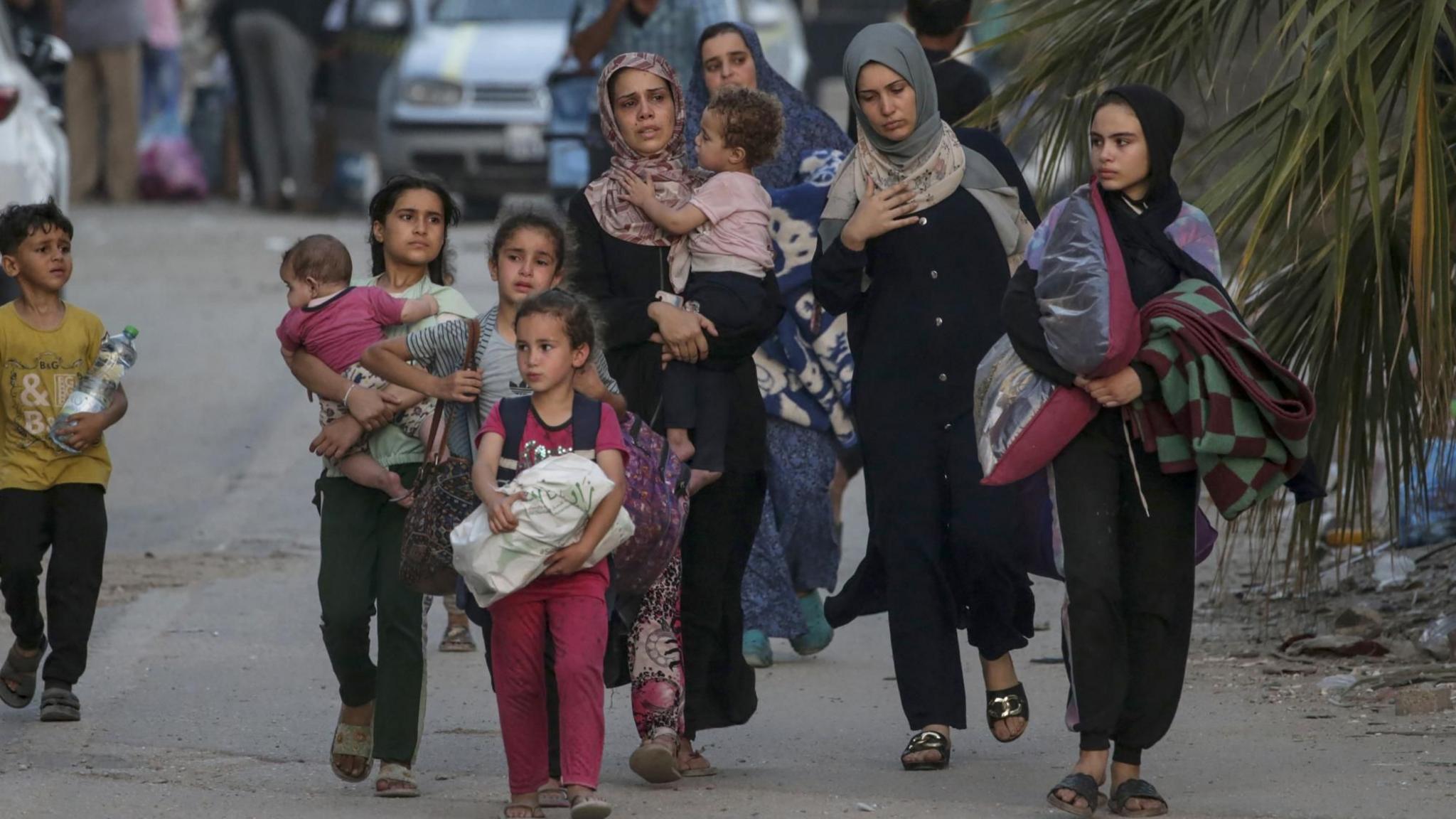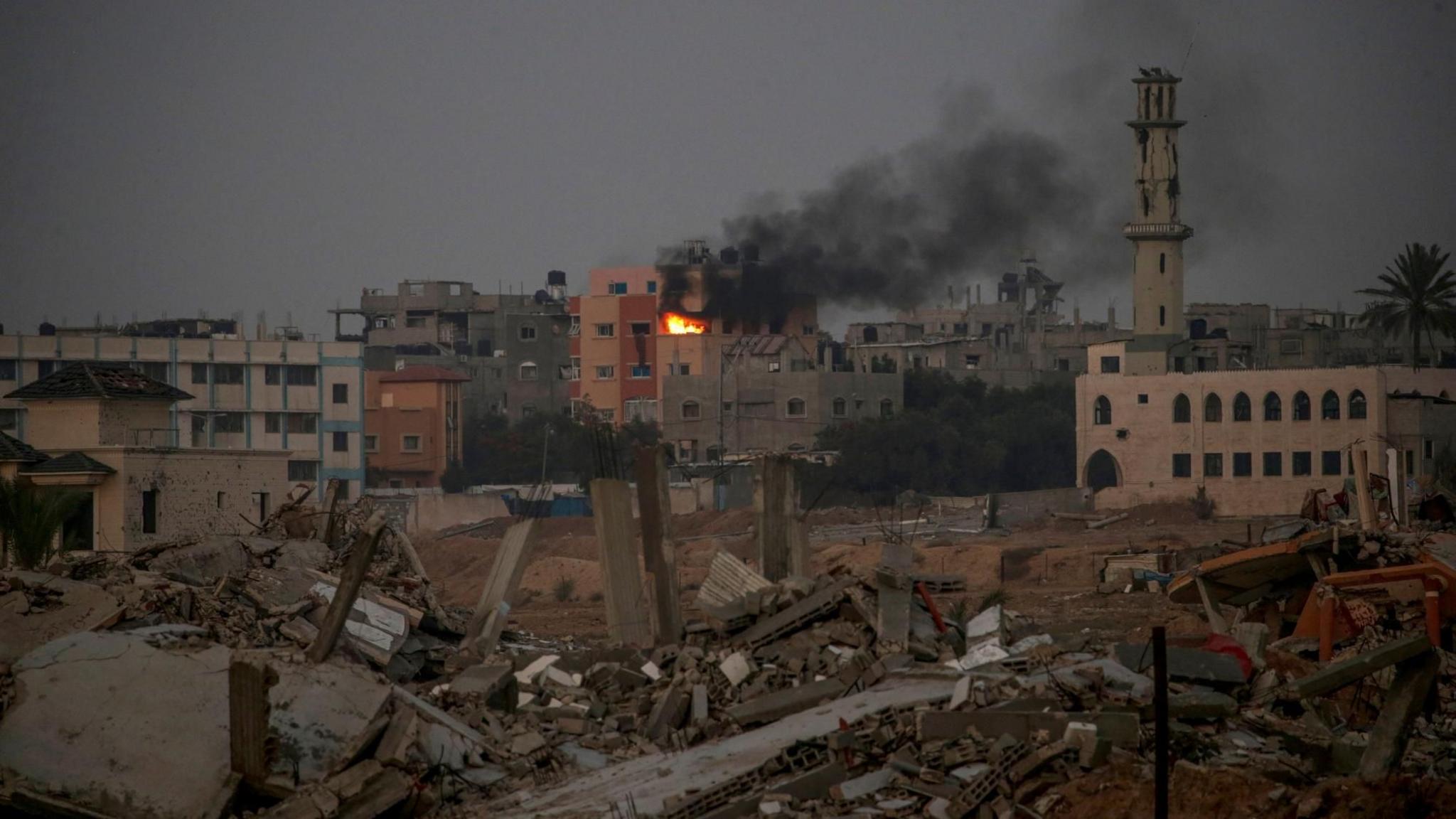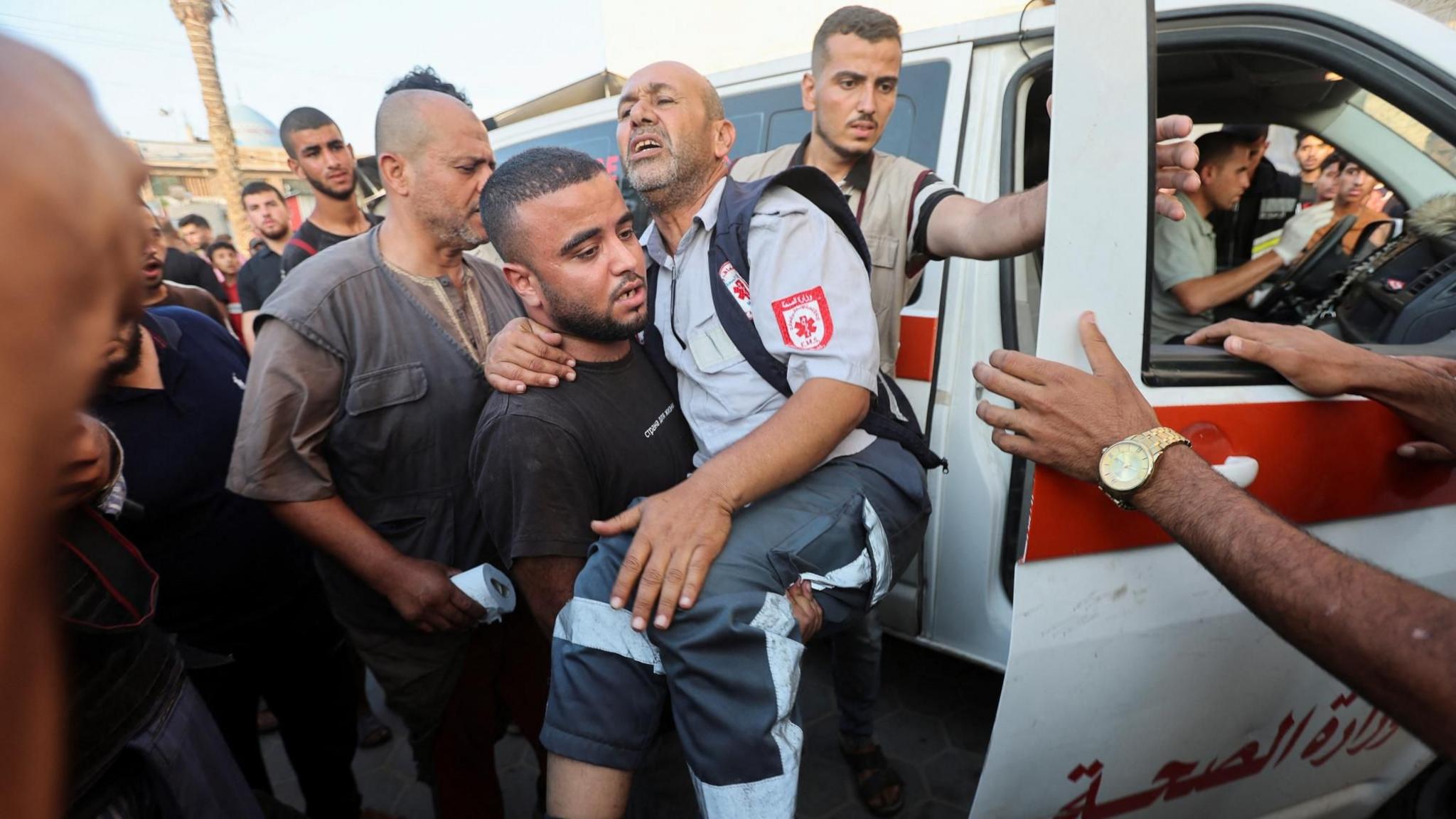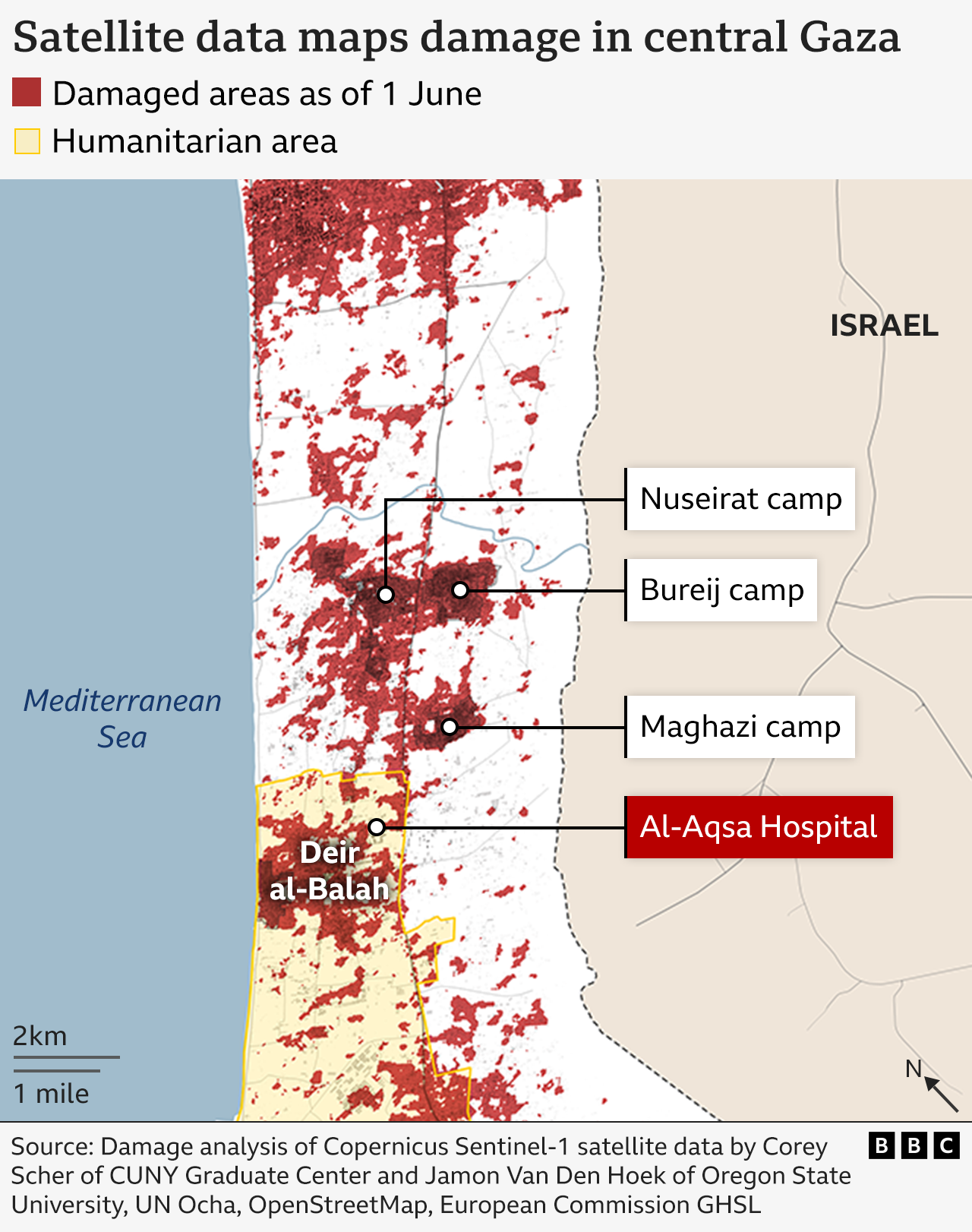Israel launches new military operation in central Gaza

Palestinian families have begun fleeing Bureij camp and surrounding areas
- Published
The Israeli military says it has taken “operational control” over eastern areas of Bureij refugee camp and the town of Deir al-Balah in central Gaza, as dozens of Palestinians were reported killed.
On Wednesday morning, the military said troops backed by air strikes had begun an operation against “terrorists and terrorist infrastructure above and below ground".
Residents reported intense bombardment and the charity Médecins Sans Frontières said at least 70 dead people - the majority women and children - had been brought to a local hospital since Tuesday.
It came as US, Egyptian and Qatari mediators meet in Doha and Cairo to discuss how to finalise a new ceasefire and hostage release deal.
The US said on Tuesday it was still waiting for a response from Hamas to what it described as an Israeli proposal outlined by US President Joe Biden last week.
Qatar said it had delivered the plan to Hamas representatives and noted that it was also still waiting for a clear position from the Israeli government.
Hamas political leader Ismail Haniyeh said on Wednesday the group would deal "seriously and positively" with a proposal based on an end to the war and a full Israeli withdrawal from Gaza.
Israel's prime minister has insisted he will not agree to a permanent ceasefire before Hamas is defeated and the hostages it is holding are released. And on Wednesday, Defence Minister Yoav Gallant declared that "all negotiations with Hamas will be conducted under fire".
Israel launched a military campaign in Gaza to destroy Hamas in response to the group's cross-border attack on southern Israel on 7 October, during which around 1,200 people were killed and 251 others were taken hostage.
At least 36,580 people have been killed in Gaza since then, according to the territory's Hamas-run health ministry.
Mass graves and body bags: al-Shifa hospital after Israel withdrew its forces
- Published5 June 2024
Israel confirms deaths of four more hostages in Gaza
- Published3 June 2024
Gaza ceasefire plan turns into deadly game of survival
- Published4 June 2024
Bureij is one of the smallest of Gaza’s eight historic refugee camps. It covers an area of 0.5 sq km (0.2 sq miles) and had 46,000 residents registered with the UN agency for Palestinian refugees (Unrwa) before the war.
The camp is just to the south of the Wadi Gaza riverbed and the IDF’s “Central Gaza Strip Corridor” - a section of land controlled by Israeli forces which runs east to west from the border with Israel to the Mediterranean Sea, dividing Gaza in two.
The Nuseirat and Maghazi refugee camps are also located near Bureij, while the town of Deir al-Balah is about 5km (3 miles) to the south-west.
The four areas are currently crowded with people displaced by fighting elsewhere, including many of the more than a million who have fled the southern city of Rafah since the start of an Israeli ground operation there a month ago.
Earlier this year, IDF troops carried out a ground operation against Hamas fighters in the camps of central Gaza that lasted several weeks.
On Wednesday, the IDF said the new "targeted" operation in Bureij and eastern Deir al-Balah was aimed at dismantling "terrorist infrastructure located several kilometres away from the border with Israel above and below ground".
“The activity started with a series of aerial strikes on terror targets, including military compounds, weapons storage facilities, and underground infrastructure," its statement added. "During the strikes, several Hamas terrorists were eliminated.”
Later, the IDF put out a new statement announcing that troops had “gained operational control” of eastern Bureij and eastern Deir al-Balah. It added that they had “eliminated terrorists” in the areas, destroyed rocket and mortar launchers, and located several tunnel shafts.

The Israeli military said it was targeting "terrorists and terrorist infrastructure"
A man from Bureij told BBC Arabic’s Gaza Today programme that his family fled the camp as the Israeli bombardment intensified on Tuesday.
“We were stunned that the army was conducting a ground operation again in Bureij,” he said. “We were struck by shells falling on us from all sides, landing on citizens’ homes, on the streets... which led to the killing of a number of citizens.”
“The situation in general is extremely difficult,” he added. “We left our homes in order to preserve our lives and the lives of our children.”
A young woman said: “Fragments fell into our home and into some of the residential apartments in our building... We survived because we all were on the lower floors.”
“We were in a residential building full of approximately 40 people, some of whom were residents of the building itself and others were people who were displaced from the north and the south, in Rafah... Now where should we head to from Bureij?”
On Wednesday morning, Palestinian news agency Wafa cited medics and rescue workers as saying at least 11 people were killed in Israeli air strikes on several homes in Maghazi overnight.
Another two people were killed in a strike on a home near the entrance to Bureij, while two more were killed by artillery fire in the Abu al-Ajen area, south-east of Deir al-Balah, it said.
Later, Médecins Sans Frontières said its medical team on the ground had described the situation at Deir al-Balah's al-Aqsa hospital - one of the only remaining functional health facilities in central Gaza - as "apocalyptic".
The charity said women and children made up the majority of the 70 dead people and 300 wounded, brought to hospital over the past 24 hours, and that many patients were suffering from severe burns, shrapnel wounds, fractures and other traumatic injuries.
"The odour of blood when I entered the emergency room [this morning] was just overwhelming. People are lying on the floor. People are lying outside... bodies being brought in white plastic bags. The families standing over them and praying," MSF medical referent Karin Huster said in an audio message.
"It's just an emotionally overwhelming situation. It's impossible for anyone to cope."

Casualties are being brought to hospitals in Deir al-Balah
At the start of its operation in Rafah on 6 May, the IDF told civilians to evacuate to an “expanded humanitarian area” stretching from the coastal al-Mawasi area to Deir al-Balah, where it said they would find tents, field hospitals and supplies.
But Unrwa warned on Monday that space for displaced families in Deir al-Balah was “running out, as people continue arriving hoping for safety where there is none”.
“Living conditions are not at all suitable for families and critical services, and supplies are limited,” it said.
The IDF also said on Wednesday that troops were continuing “targeted operations” in Rafah. It added that they had “located weapons and eliminated armed terrorists”, without providing further details.
Residents told Reuters that Israeli tanks had mounted raids into the centre of Rafah and deeper into the west before retreating to eastern and southern areas.
As well as displacing civilians, the Rafah operation has resulted in the amount of humanitarian aid entering Gaza dropping by two-thirds, according to the UN.
Egypt has closed the nearby Rafah border crossing since Israeli forces took control of the Gazan side almost a month ago and the UN has said it is too dangerous to reach the nearby Kerem Shalom crossing with Israel.
“In Gaza, delivering aid has become almost impossible,” outgoing UN humanitarian chief Martin Griffiths told reporters on Tuesday. “We need all border crossings open. We need safe and unimpeded access. We need to prioritize humanitarian aid.”
He spoke after an independent group of experts warned in a report that it was “possible, if not likely” that famine was under way in northern Gaza, external. However, the US-funded Famine Early Warning Systems Network (FEWS NET) said hostilities and access constraints had impeded the collection of data to prove that.
A UN-backed assessment estimated in March that 1.1 million people across Gaza were facing catastrophic hunger and that famine was imminent in the north by May. Israel disputed the report, saying it contained factual and methodological flaws.
